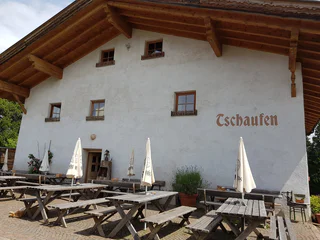
1/4
Mölten - St. Georgen - Gasthof Tschaufen
Terlano/Terlan, Terlan/Terlano, Bolzano/Bozen and environs
easy
Difficulty
486 m
elevation gain
2h:16 min
duration
Walking is the best way to enjoy wonderful stretches of greenery. During your spring in South Tyrol, you can witness the awakening of nature in the valley and on the alpine meadows in bloom. Midsummer days are equally surprising: people are lured to mountain peaks, marvel at sweeping views and indulge in the traditional dishes served in quaint mountain huts. Go on a hike to watch the spectacle of autumn’s glorious colours and relax in nature.

1/4
Terlano/Terlan, Terlan/Terlano, Bolzano/Bozen and environs
easy
Difficulty
486 m
elevation gain
2h:16 min
duration

Colle/Kohlern, Bolzano/Bozen, Bolzano/Bozen and environs
medium
Difficulty
507 m
elevation gain
2h:34 min
duration

1/2
Cologna/Glaning, Jenesien/San Genesio Atesino, Bolzano/Bozen and environs
medium
Difficulty
338 m
elevation gain
3h:28 min
duration

1/2
Vallesina/Versein, Mölten/Meltina, Bolzano/Bozen and environs
easy
Difficulty
393 m
elevation gain
1h:22 min
duration

1/4
Vallesina/Versein, Mölten/Meltina, Bolzano/Bozen and environs
easy
Difficulty
117 m
elevation gain
0h:31 min
duration

Oberbozen/Soprabolzano, Ritten/Renon, Bolzano/Bozen and environs
medium
Difficulty
190 m
elevation gain
3h:10 min
duration

Rencio/Rentsch, Bolzano/Bozen, Bolzano/Bozen and environs

Valdurna/Durnholz, Sarntal/Sarentino, Bolzano/Bozen and environs
medium
Difficulty
0 m
elevation gain
5h:19 min
duration

1/4
Vallesina/Versein, Mölten/Meltina, Bolzano/Bozen and environs
medium
Difficulty
372 m
elevation gain
1h:08 min
duration

1/2
Vallesina/Versein, Mölten/Meltina, Bolzano/Bozen and environs
medium
Difficulty
181 m
elevation gain
0h:34 min
duration

St. Oswald/S. Osvaldo - Kastelruth/Castelrotto, Kastelruth/Castelrotto, Bolzano/Bozen and environs
medium
Difficulty
307 m
elevation gain
2h:25 min
duration

1/4
Nobls/Nobls, Jenesien/San Genesio Atesino, Bolzano/Bozen and environs
medium
Difficulty
177 m
elevation gain
1h:01 min
duration

1/4
Sill/Sill, Ritten/Renon, Bolzano/Bozen and environs
medium
Difficulty
204 m
elevation gain
0h:49 min
duration

1/3
Soprabolzano/Oberbozen, Ritten/Renon, Bolzano/Bozen and environs
medium
Difficulty
707 m
elevation gain
4h:46 min
duration

1/4
Vallesina/Versein, Mölten/Meltina, Bolzano/Bozen and environs
easy
Difficulty
91 m
elevation gain
0h:33 min
duration

1/4
Auna di Sotto/Unterinn, Ritten/Renon, Bolzano/Bozen and environs
medium
Difficulty
152 m
elevation gain
1h:08 min
duration

Colle/Kohlern, Bolzano/Bozen, Bolzano/Bozen and environs
easy
Difficulty
331 m
elevation gain
1h:48 min
duration

Vallesina/Versein, Mölten/Meltina, Bolzano/Bozen and environs
medium
Difficulty
361 m
elevation gain
2h:49 min
duration

Nobls/Nobls, Jenesien/San Genesio Atesino, Bolzano/Bozen and environs
medium
Difficulty
356 m
elevation gain
2h:46 min
duration

Prati/Auen, Sarntal/Sarentino, Bolzano/Bozen and environs
medium
Difficulty
446 m
elevation gain
2h:30 min
duration

Schernag/Schernag, Tisens/Tesimo, Bolzano/Bozen and environs
medium
Difficulty
763 m
elevation gain
2h:22 min
duration

1/3
Vallesina/Versein, Mölten/Meltina, Bolzano/Bozen and environs
easy
Difficulty
121 m
elevation gain
1h:37 min
duration

Sill/Sill, Ritten/Renon, Bolzano/Bozen and environs
easy
Difficulty
51 m
elevation gain
0h:30 min
duration

Glen/Gleno, Montan/Montagna, Bolzano/Bozen and environs
medium
Difficulty
137 m
elevation gain
1h:31 min
duration

Soprabolzano/Oberbozen, Ritten/Renon, Bolzano/Bozen and environs
easy
Difficulty
78 m
elevation gain
1h:19 min
duration

1/2
Vallesina/Versein, Mölten/Meltina, Bolzano/Bozen and environs
medium
Difficulty
415 m
elevation gain
4h:07 min
duration

1/17
S. Osvaldo/St. Oswald - Bolzano/Bozen, Bolzano/Bozen, Bolzano/Bozen and environs
difficult
Difficulty
1113 m
elevation gain
5h:55 min
duration

Verano/Vöran, Vöran/Verano, Bolzano/Bozen and environs
medium
Difficulty
511 m
elevation gain
2h:57 min
duration

1/5
Nobls/Nobls, Jenesien/San Genesio Atesino, Bolzano/Bozen and environs
easy
Difficulty
89 m
elevation gain
1h:16 min
duration

1/4
Verano/Vöran, Vöran/Verano, Bolzano/Bozen and environs
medium
Difficulty
358 m
elevation gain
2h:31 min
duration